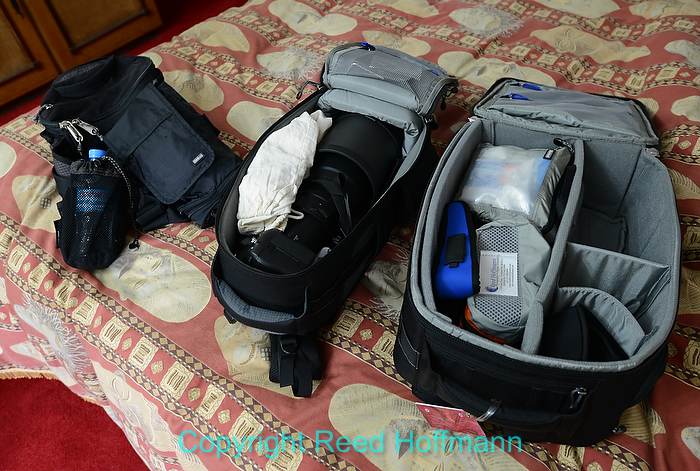People often ask me how to pack for photo trips, which can be a real challenge for photographers these days. Airlines have gotten stricter about both checked and carry-on bags. Traveling internationally, you may find the rules going are different than the rules coming back. Or you may might end up flying multiple airlines that have different rules. Over the last decade I’ve done lots of international travel, and recently returned from leading a workshop in Africa. While preparing for this trip I shot a series of pictures showing the bags and how I packed them.
First things first – I’ve learned that taking less stuff makes the trip more enjoyable. I usually go with three bags – a rolling duffle bag to check, a small backpack with my main camera gear and laptop for carry-on, and a fanny pack with the stuff I’ll want on the plane (also carry-on, my purse, so to speak). I also check with every airline I’ll be on to find out their baggage policy. I end up in small planes sometimes, and want to make sure the overhead compartment will hold my backpack. And that information sometimes dictates which airlines I use.
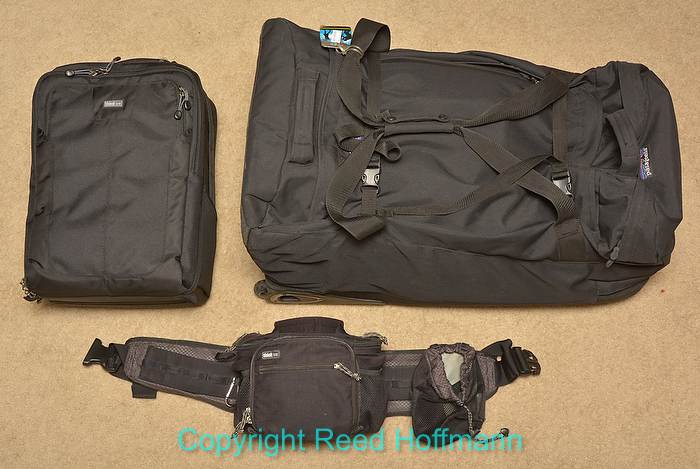
Here’s my usual travel kit – Thinktank Speed Demon fanny pack, Thinktank Airport Commuter backpack and a Patagonia rolling duffle bag. Photo copyright Reed Hoffmann.
Since my priority is photography, I want to take everything I might need, within reason. That means I first have to think about what kind of photography I’ll be doing. For wildlife trips, like Africa, you want as much lens (long telephoto) as possible. And you always want at least two bodies, so you don’t have to change lenses as frequently (and have a backup should one fail). I also want most of the camera gear to stay with me, not checked but as my carry-on. Things like the tripod always go in the rolling duffle, along with any other less expensive photo gear I could do without if the bag doesn’t make it. If that carry-on backpack is getting too heavy, I’ll put a camera and/or lens in the fanny pack.
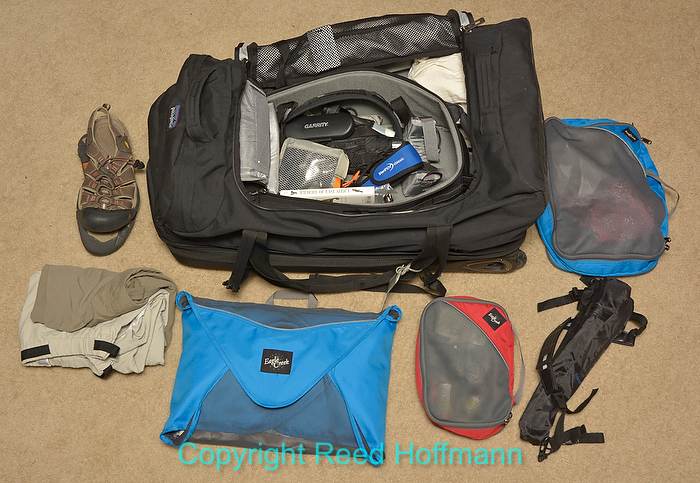
Here you can see the rolling duffle bag partially unpacked, including the Thinktank Lens Limo packed inside the roller. Photo copyright Reed Hoffmann.
One added challenge for the traveling photographer is that a bag for carrying gear during travel is likely not the best bag to work from once there. I love backpacks for getting my gear from point A to point B, but find them hard to work out of. I’ve found two solutions to this. One, the fanny pack I use on the plane accepts additional pouches attached to it. So I pack the pouches in my luggage, and once there attach them to the belt. The other solution, that I used for Africa, was to pack a smaller bag (sometimes a shoulder bag) in my duffle, and move my gear to it once we arrive. In Africa we shoot from trucks, so I could have that smaller bag be a small backpack, used in the truck with my 500mm lens zipped inside, safe from dust.
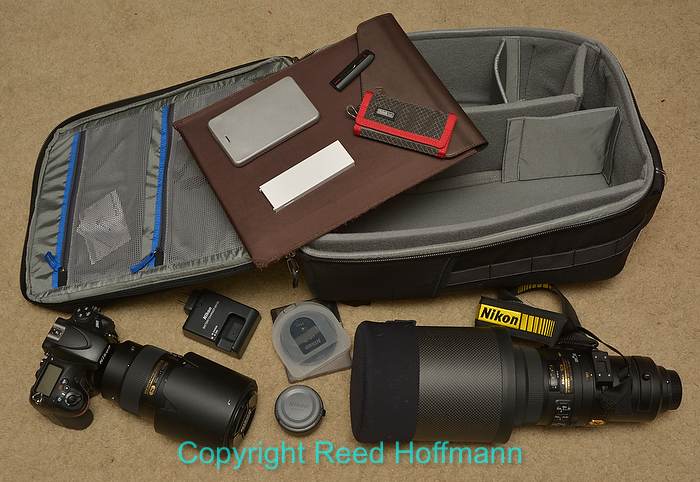
Here’s the contents of the Thinktank Airport Commuter. Note that it could take the second camera body if I didn’t want to have it in the fanny pack. Photo copyright Reed Hoffmann.
If you’re going to take a lot of camera gear, then you probably have to take less clothing. I’ve done a number of trips with just one pair of shoes, though most of the time I take a comfortable pair of walking shoes and a pair of closed-toe sandals. I’ll plan on washing clothes while there (either in the shower or use a laundry service), and the clothing I take is synthetic that dries fast. The shirts are always long-sleeved. If it’s hot I roll the sleeves up, but I have those long sleeves for warmth and/or sun protection too. One nice trick I learned from a student years ago was to bring some old clothing, and throw it away as I go.
Choice of bags is important too. Lots of people like the backpacks that have wheels and handle so they can be rolled. That hardware adds quite a bit of weight to the bag, so even empty it might weigh from one-third to one-half of your allowance. That’s why I use those simple, no wheels or hardware backpacks from Thinktank. And that’s also why I use a rolling duffle bag. The weight of the wheels and hardware in it are offset by the fact that it’s soft-sided.
Here’s how I packed for Africa:
Gear in Thinktank backpack (Commuter, to carry on plane), 24 lbs.
80-400mm f/4.5-5.6 VR
500mm F/4 VR
TC-14e
Nikon D800
One charger for D7100/D800 batteries
Power plug adapters (1) for Tanzania (Type G)
Asus Zenbook, 256GB HDD, 4GB RAM 13-inch laptop, under 3 lbs
Folder with client and trip info
1 USB 3 card reader
77mm polarizing filter
1 Grad ND filter
3 32GB CF cards (D800)
5 32GB SD cards (D7100)
2 16GB SD cards as spares
1 32GB USB 3 stick for backing up key photos to
1 256GB portable SSD drive to back everything up to
Money
Itinerary
8GB SD card with Nikon software and manuals
Fanny Pack (Thinktank Speed Demon, also carried on plane), 7lbs.
Nikon D7100 and 16-35mm f/4 VR lens (starting in backpack)
Cell phone
Nook HD (books, mags, movies on plane)
Phone charging cable.
TekCharge power/charger with 4 AA batteries
Charger for Asus Zenbook
Snacks
Earplugs and eyeshades
Earbuds for music and movies
Notebook and 3 pens
Malaria meds
2 sleeping pills (for flights)
Kerchief
Toothpicks and throwaway toothbrush for plane
Roller duffel (Patagonia), 35lbs.
6 shirts (lightweight, long-sleeve)
2 pair long pants
Lightweight rain jacket
Sun hat
2 pair socks
1 pair closed toe sandals (Keen)
3 t-shirts (cotton, 2 old, to leave behind)
3 pair underwear (synthetic, wash and dry overnight)
1 pair boxer shorts for pajamas
1 kerchief
Toiletry kit with 110-240 volt shaver, meds, copy of passport, etc.
Small lightweight tripod
Lightweight plastic raincoat for long lens (or kitchen garbage bag)
All of the below in a Thinktank Lens Limo packed inside the roller duffle (lens limo will be used for big lens in truck):
Second charger for D7100/D800 batteries
Spare battery (making a total of three)
Nikon SB-600 flash
Cotton bag for truck (to protect gear from dust when driving)
Cleaning kit (blower, tissue, liquid, screwdriver set)
1 USB 3 Card reader (as backup)
Stuff sack to use as beanbag
Light-painting flashlight
CarrySpeed LCD viewfinder for shooting video
MKE-1 mike for recording audio with cameras
Africa phone and charger
Plug adapter for Africa (second)
East Africa wildlife book
Mini umbrella
Small headlamp
Steri-Pen water purifier
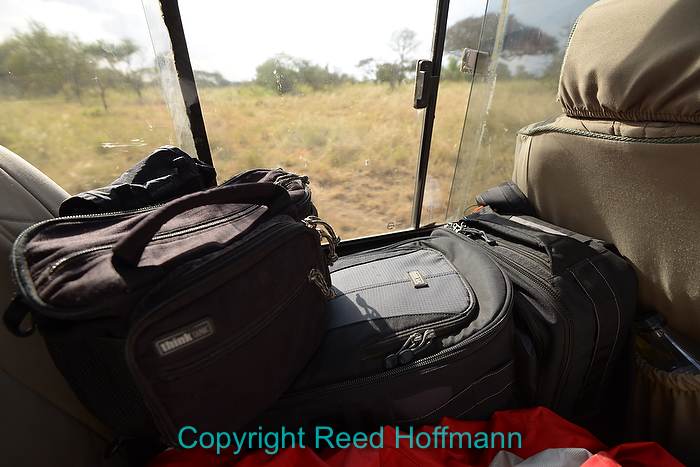
The Speed Demon and Lens Limo in the truck we shoot from, all zipped up to keep the dust out. Photo copyright Reed Hoffmann.
With this setup I was relatively comfortable carrying my gear and could do it easily by myself. When the trip’s over and it’s time to go home, I move some of the less expensive gear from the backpack to the checked bag. That means filters, chargers, plug adapter(s), card readers and anything else I can do without for the flights home.
A successful photo trip doesn’t just mean good pictures. It means you’ve had a good time too, and being able to comfortably manage your gear is a part of that. If you want to join me on a trip sometime, check out the workshops I have planned, here .
Want to see photos from our trip? They’re right here.
(If you want to buy any Thinktank bags, use this link and you’ll get a free pouch with every order over $50)

